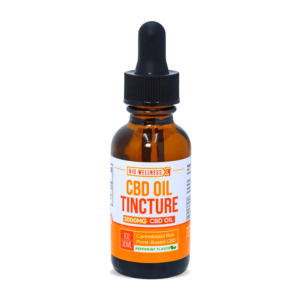The popularity of CBD oil has grown faster than people’s understanding of it. It’s not surprising, then, that so many people are mistakenly buying the wrong products in their attempt to try CBD oil. The most common imposter that deceives consumers is hemp oil.
If you’re unsure whether to choose hemp oil or CBD, you’re not alone. Although they come from the same plant, they have different uses and benefits. This article will help clear up the confusion by guiding you through the unique advantages of each option.
Hemp oil is often used interchangeably with CBD oil, but it’s worth noting that some people might also use the term “hemp oil” to refer to hemp seed oil.
CBD stands for cannabidiol. The oil is made from the flowers, leaves, and stalks of the hemp plant, which contain a high concentration of CBD, a compound with numerous potential health benefits.
While similar, these two compounds have major differences. So let’s dive in and explore the differences between Hemp Oil and CBD Oil.
Main Key Points
- Hemp seed oil is rich in nutrients for diet and skincare, while CBD oil Offers potential therapeutic effects like pain relief.
- Hemp oil and CBD oil can support the body’s endocannabinoid system but in different ways.
- Hemp seed oil primarily serves as a dietary supplement due to its nutritional profile, while CBD oil is often sought for its medicinal properties.
- To make an informed decision, consumers must understand the differences and choose the product that best aligns with their health and wellness goals, whether they seek nutritional support or therapeutic benefits.
Unlocking the Power of Plants: Hemp Oil vs. CBD Oil – A Breakdown of Benefits
Before talking about the potential benefits of both CBD and hemp oil, let’s take a deeper look in their origins.
Hemp Seed Oil and Its Benefits
Hemp or hemp seed oils this oil is extracted from the seeds of the hemp plant and offers a robust and nutty flavor. Consisting of around 70 to 90% of polyunsaturated fatty acids (often referred to as healthy fats), it’s abundant in omega-3 essential fatty acids, tocopherols and linoleic and linolenic acids.
Since hemp seeds don’t contain cannabinoids, this type of hemp oil is not intoxicating—although it does provide plenty of other functional benefits, thanks to its healthy balance of polyunsaturated omega-6 and omega-3 fatty acids.
Now, let’s talk about the potential benefits of hemp oil.
- Nutrient Powerhouse: Hemp oil contains beneficial omega fatty acids, vitamin E, and essential minerals like potassium and magnesium, providing a nutritious boost for your body.
- Healthy Skin: Have you ever dreamed of having radiant, glowing skin? Hemp oil might just be your secret weapon. Its moisturizing properties can help keep your skin hydrated and happy.
- Heart Health: Hemp oil contains omega-3 and omega-6 fatty acids, which are great for your heart! They can help support cardiovascular health and keep your ticker ticking happily.
CBD oil and Its Benefits:
CBD oil is created by combining hemp extract with a carrier oil. The most popular carrier oil for CBD is medium-chain triglyceride (MCT) oil, which is derived from coconuts. Vegetable oil, sunflower oil, almond oil, and olive oil can all be utilized as carriers.
There are mainly three varieties of CBD oil available on the market. CBD oil can be full-spectrum or broad-spectrum. Full-spectrum CBD oil contains all cannabis plant chemicals, including THC, at a low level. Broad-spectrum CBD oil contains many compounds but not THC. CBD isolate oil contains solely CBD.
So, let’s hear the benefits of the high and mighty CBD oil:
- Physical Relief: Studies suggest that CBD can alleviate or manage achey joints and muscles by interacting with your body’s endocannabinoid system.
- Anxiety and Stress Relief: In today’s fast-paced world, who couldn’t use a little stress relief? CBD oil might help take the edge off, promoting feelings of relaxation and calmness.
- Sleep Support: Some people find that CBD oil helps them relax and drift off into dreamland more easily.
How do Hemp Oil and CBD Oil Interact with the Body’s Endocannabinoid System?
In simple terms, we can say that the endocannabinoid system (ECS) is a network of receptors found throughout the body, including in the brain, organs, connective tissues, glands, and immune cells. It’s like a messaging system in our bodies that helps to keep things balanced and running smoothly. It’s involved in regulating things like mood, appetite, sleep, and even pain sensation.
Now, the question arises: how do hemp oils and CBD oil interact with the ECS?
Both CBD oil and hemp oil interact with ECS in their own unique ways. Let’s discuss CBD oil first.
CBD oil is rich in cannabidiol, and the first thing this oil does after entering our body is interact directly with the ECS by binding to receptors called CB1 and CB2. This interaction can influence various processes in the body, such as mood, pain sensation, appetite, and immune function. This interaction can help regulate the balance of different bodily functions, promoting overall well-being.
On the other hand, hemp oil or hemp seed oil does not directly interact with the endocannabinoid system; in fact, it interacts with it in an indirect manner. Hemp or dietary hempseed oil indirectly supports the ECS by providing the nutrients needed for proper functioning.
In summary, both hemp oil and CBD oil can support the body’s endocannabinoid system, but they do so in different ways. Hemp oil provides essential nutrients that indirectly support the ECS, while CBD oil directly interacts with ECS receptors to regulate various bodily functions.
Finding Your Wellness Ally: Which Suits Your Needs – Hemp Oil vs. CBD Oil?
If you are confused between hemp oil and CBD oil, it is critical to take into account what exactly you want and need.
First things first, Hemp oil primarily contains nutrients, while CBD oil contains cannabidiol, which interacts with the body’s endocannabinoid system to potentially offer various health benefits.
So, if you’re seeking potential relief from specific health issues, CBD oil might be the better choice. If you’re looking to boost overall nutrition or improve skin health, hemp oil could be a great addition.
The second and most important thing to consider is whether both products are legally available in your state or not. Hemp-derived CBD oil is legal in many places, but it’s essential to check local regulations as laws vary. Hemp oil is typically legal and widely available.
Based on its numerous benefits, CBD oil comes in various forms and it’s all based on the sort of your needs. CBD oil is often taken orally as drops or capsules for the purpose of pain relief, good sleep, and other relaxation benefits, while hemp oil is commonly used in cooking, skincare products, and supplements.
So, based on the points above we can state that both hemp oil and CBD oil offer potential health benefits, but they serve different purposes. Whether you’re seeking nutritional support or potential relief from certain health issues, understanding the differences between these oils can help you choose the one that best suits your needs. Always consult with a healthcare professional before incorporating any new supplement into your routine, especially if you have existing health conditions or are taking medication.
Beyond the Label: Exploring the Regulatory Landscape of Hemp and CBD Products
In recent years, hemp and CBD products have become incredibly popular due to their potential health benefits. However, understanding the rules and regulations surrounding these products can be confusing for both consumers and businesses.
Cannabis has a long history of medicinal use, dating back thousands of years. The use of it became restricted in the 20th century. Recently, many countries have been legalizing medical cannabis again, recognizing its potential benefits. The UN also acknowledged the medical value of cannabis in 2020.
CBD, a substance found in cannabis plants that doesn’t make you feel high, has become popular for its possible health benefits. Even though the World Health Organization said that pure CBD shouldn’t be tightly controlled because it doesn’t affect your mind, many governments haven’t made those changes yet. So, CBD still faces different rules around the world, affecting how much you can find and use it.
Also, National laws about drugs have made the rules even more complicated. Every country has its own way of understanding international agreements, so the rules are different everywhere. Because nearly 50 countries have allowed medical cannabis, it’s really important for businesses to understand all these different rules if they want to join the market.
It should be kept in mind that the rules and laws about hemp and CBD products are complicated and always changing. Even though more and more people want these products, businesses need to understand the rules well to follow them and do well in the market.
Safety First: Potential Interactions Between Hemp Oil or CBD Oil and Medications
While generally considered safe, CBD is a biologically active substance, meaning it could lead to unintended outcomes. While current research generally suggests CBD is safe with minimal side effects, there’s a significant caveat: it could interact with certain medications. This concern arises from how the body processes specific substances.
When you ingest a medication or any other substance, your body metabolizes that substance, breaking it down into smaller parts. This metabolic process occurs in various parts of the body, including the digestive system, but the liver plays a significant role as well.
A group of enzymes called cytochrome P450 (CYP450) is responsible for the crucial task of converting foreign substances so that they can be easily eliminated from the body.
However, certain medications or substances can influence the activity of CYP450, either by slowing down or speeding up the metabolism of drugs. This change in the rate of metabolism can impact how your body processes the medications or supplements you’re taking, leading to a drug interaction.
Research indicates that the CYP450 family of enzymes, especially CYP3A4, plays a crucial role in breaking down cannabinoids like CBD. However, CBD can interfere with CYP3A4, which is responsible for metabolizing about 60% of prescribed medications. This interference means medications may not be broken down as effectively, leading to either too much medication in your system, causing potential side effects, or too little medication to treat health issues effectively.
So, enough with the medical terms. What we are trying to say is before trying CBD to help with your symptoms, discuss it with your doctor first. They can advise you on the right CBD product, dose, and timing that won’t interfere with your current medications.
Proper Dosing: How Much Hemp or CBD Oil Should You Take?
CBD is thought to help with different health issues like anxiety and pain relief. However, knowing how much CBD to take can be confusing.
Firstly, it’s important to know that there isn’t a one-size-fits-all dosage for CBD. The right amount for you depends on factors like your body weight, the reason you’re taking it, and how your body responds to it.
A good rule of thumb is to start with a low dose and gradually increase it until you find the right amount for you. Most experts recommend starting with 10-20 milligrams per day for general wellness or mild symptoms. You can then increase the dose by 5-10 milligrams every week until you achieve the desired effects.
Another thing to consider is the form of CBD you’re taking. CBD comes in various forms, including oils, capsules, edibles, and topicals. Each form has its own absorption rate, so you may need to adjust your dosage accordingly.
All in all, finding the right CBD dosage involves some trial and error. Start low, gradually increase your dose, and pay attention to how your body responds. And always consult with a healthcare professional for personalized advice.
Let’s Talk Science: Research-Backed Applications of Hemp and CBD Oil
We have talked enough about the uses, benefits, etc, of CBD and hemp oil. Now, let’s look at the ways CBD oil could benefit your health.
- Addressing Anxiety and Depression: CBD, found in hemp, has calming effects, which could help anxiety suffers find a little relief.
- Treating Select Epilepsy Syndromes: the FDA has officially approved the CBD medication Epidiolex for rare epilepsy types, reducing seizures in patients.
- Relieving Physical Aches Discomfort: Topical CBD reduced nerve pain in studies, offering localized relief.
- Neurological Protection: CBD’s antioxidant and anti-inflammatory properties may provide neuroprotection against diseases like Parkinson’s and Alzheimer’s.
- Inhibiting Arthritis Symptoms: CBD may relieve achey joints and suppress symptom activity in arthritis patients, though results vary.
- Benefits for Gastrointestinal Health: CBD may have positive effects on GI health, including appetite stimulation and inflammation reduction.
- Sleep Support: With its naturally calming benefits, CBD may help support a full, healthy night’s sleep.
- Understanding Hemp’s Nutritional Composition: Research is expanding to explore the nutritional benefits of different parts of the hemp plant beyond just the seeds.
It’s important to note that while there is promising research on the potential benefits of hemp and CBD oil, more studies are needed to fully understand their effects and determine the appropriate dosages for different conditions. Additionally, the legality of hemp and CBD products varies by region, so it’s essential to consult with a healthcare professional before incorporating them into your wellness routine.
A World of Options: Exploring Different Forms of Hemp Seed and CBD Oil Products
In today’s market, there’s a wealth of options when it comes to hemp seed and CBD oil products. Let’s break down some of the key terms and explore what each offers:
1. Hemp Seed Oil: This oil is extracted from the seeds of the hemp plant (Cannabis sativa). It’s rich in healthy fats, such as omega-3 and omega-6 fatty acids, and is often used in cooking and skincare products. Hemp seed oil doesn’t contain CBD or other cannabinoids.
2. Dietary Hemp Seed Oil: Just like regular hemp seed oil, this variant is derived from hemp seeds and is also packed with essential nutrients. It’s commonly used as a nutritional supplement, added to foods like salads or smoothies.
3. CBD Products: CBD, short for cannabidiol, is a compound found in the flowers and leaves of the hemp plant. It’s known for its potential therapeutic effects, including reducing anxiety, alleviating pain, and improving sleep. CBD products come in various forms, including oils, capsules, edibles, and topicals.
4. Full Spectrum CBD Oil: This type of CBD oil contains not only CBD but also other beneficial compounds found in the hemp plant, such as other cannabinoids (like THC, but in trace amounts that won’t cause psychoactive effects), terpenes, and flavonoids. Some people believe that full-spectrum CBD oil provides enhanced benefits due to the synergistic effect of these compounds working together.
5. Hemp flower: Hemp buds come from a variety of the Cannabis sativa plant species that are cultivated specifically for industrial purposes, including the production of hemp seed oil, CBD oil, textiles, and more. Unlike marijuana, hemp flower contains very low levels of THC (tetrahydrocannabinol), the psychoactive compound responsible for the “high” associated with cannabis.
When choosing hemp seed or CBD oil products, it’s essential to consider factors such as quality, extraction methods, and third-party lab testing to ensure you’re getting a safe and effective product. Additionally, it’s advisable to consult with a healthcare professional, especially if you’re considering using CBD products for medicinal purposes or if you have any underlying health conditions.
Final Thoughts: Hemp Oil vs CBD Oil
Hemp seed oil, derived from the seeds of the cannabis sativa plant, is rich in essential fatty acids and nutrients, making it a valuable addition to the diet and skincare routines.
On the other hand, CBD oil, extracted from the flowers and leaves of hemp plants, contains a variety of cannabinoids, including cannabidiol (CBD). CBD products are known for their potential therapeutic effects, such as pain relief, anxiety reduction, and promoting overall well-being.
While hemp seed oil and CBD oil both come from the same cannabis plant, they serve different purposes. Hemp seed oil is more akin to a dietary supplement, while CBD oil is often used for its medicinal properties. It’s essential for consumers to understand the difference between hemp and CBD oil and choose the product that aligns with their needs and preferences.
We have gathered that hemp seed oil and CBD oil offer distinct benefits, with hemp seed oil focusing on nutrition and CBD oil targeting potential therapeutic effects. Understanding their differences can empower individuals to make informed choices for their health and wellness goals.

Legal Disclaimer:
By reading this information presented, you agree to release the author of any liability that comes from using this data. This post contains no legal advice. Federal and state laws about cannabis are subject to change. Claims about cannabinoids have not yet been approved by the FDA. Read the full legal disclaimer here.
Other Articles Related to CBD
- Best CBD Products for Muscle Recovery
- CBD vs Delta-8: What’s the Difference?
- Wellness CBD Gummies Review
- Is Infused Hemp Flower Weed?
- How to Infuse Hemp Flower at Home
- What Are Snowcaps? Exploring THCa Dusted Flower
References:
- Hemp Production and the 2018 Farm Bill – 07/25/2019 | FDA
- The Controlled Substances Act (dea.gov)
- Hemp Production and the 2018 Farm Bill – 07/25/2019 | FDA
- The Controlled Substances Act (dea.gov)
- The cannabis Terpenes
- Cannabinoids and terpenes
- Therapeutic Efficacy of Cannabidiol (CBD)
- Cannabidiol in Anxiety and Sleep
- Cannabidiol use and effectiveness
- Harvard Health on CBD
FAQs About CBD and Hemp Oil
It depends on your needs. Hemp oil comes from hemp seeds and is rich in nutrients, while CBD oil is extracted from hemp plants and contains cannabinoids like CBD. If you’re seeking nutritional benefits, hemp oil might be preferable. If you’re targeting specific health concerns, CBD oil might be more suitable.
Hemp oil is rich in essential fatty acids, vitamins, and minerals, which can support overall health. It may help with skin health, brain function, heart health, and more.
Possible disadvantages include potential allergic reactions, digestive issues for some individuals, and the risk of consuming contaminants if not properly sourced.
No, they are different. Hemp refers to the plant Cannabis sativa, while CBD (cannabidiol) is a compound extracted from hemp plants. Hemp has various uses beyond CBD extraction, such as fiber production and hemp seed oil.
It depends on what you’re looking for. Hemp oil is valued for its nutritional content, while CBD oil is sought after for its potential therapeutic effects due to its cannabinoid content.
No, they can have different effects. Hemp oil is primarily a nutritional supplement, while CBD interacts with the endocannabinoid system in the body, potentially offering various health benefits.









